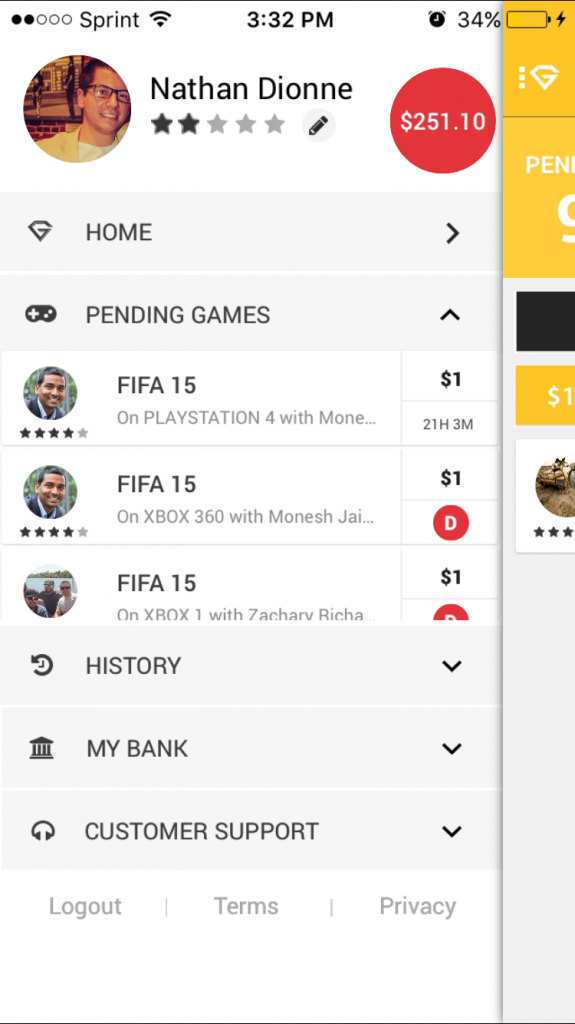
With the state of Nevada moving to ban DraftKings and FanDuel on Thursday, there’s no sign of the controversy ending for the two fantasy sports companies that are standing by the argument that they’re skilled-based games and not a form of gambling. And it’s most certainly not discouraging some Boston entrepreneurs from exploring their own take on the concept.
One of those entrepreneurs is Nathan Dionne, a former CTO at Barstool Sports, who is combining the idea of skill-based games with the growing popularity of eSports—the competitive segment of the video game world that has become a $612M global market, according to research firm Super Data.
Together with his co-founder, Jong Soo Hallet, Dionne is building an online service called Gamer Duel, an app that lets fans of sports video games connect and compete in one-on-one matches for cash—that is, their own cash. Gamer Duel will make money by taking a small percentage off every winning.
Given the regulatory challenges DraftKings and FanDuel are now facing, it might sound like a big bet for Dionne and Hallet to get in this space at this time. But Dionne told BostInno he’s confident Gamer Duel would pass the test of being a skill-based game and not gambling because video games by their very nature require skill to win.
“The question that DraftKings and FanDuel are going to face now is, is what they’re doing at the core actually a skill based game? I think for what we’re doing and what people in our market are doing is very clear. This is a skill-based competition,” Dionne said.
Gamer Duel is currently in closed beta, with plans to go into open beta by November or December. The app is currently only available for iPhone, but there are plans to eventually bring it to Android.
Dionne said he decided to start the service only supporting video games in the sports genre, like Madden and FIFA, because he feels that it’s been a relatively untapped market in the eSports world—where fantasy and action games are currently the most popular genres—especially when it comes to people who play sports video games frantically but don’t consider themselves “gamers.”
“There are going to be so many companies started in the eSports world, and I challenge pretty much every company to think outside of the people who are already in it,” Dionne said, adding that Gamer Duel will eventually expand to support other genres.
Even if Gamer Duel will only focus on sports games for now, it’s a major market in itself, with three sports games making research firm NPD’s list of top-selling games of 2014, with Madden in second place to that year’s iteration of mega-popular Call of Duty series.
The app works by letting you sign up and add money to a digital wallet, which you can then use to wager in one-on-one matches. Once the game is complete, the app uses what Dionne describes as an “eBay-esque, Uber-esque system where you actually submit your own results.” When both people agree on the outcome, the money is transferred to the winner’s digital wallet.
So what happens when two players disagree on the outcome?
Dionne said part of the app’s platform will help players attempt to resolve disputes themselves, and that includes a messaging tab that lets them iron out any beefs they have. But if that doesn’t work, there are other features, such as the ability to submit a screenshot of the match’s final score that would allow a GamerDuel employee to determine the winner.
“I think (DraftKings) is sort of leading the whole concept of skill-based gaming. As they pave the way, it’s more comfortable to follow in their footsteps.”
Even then, results can be tampered, and there may be other issues that arise. Which is why Dionne is developing a platform that empowers the community to weed out any bad actors who may be known for repeatedly disputing outcomes or other bad behavior.
“It’s easy to say, ‘look, every game is going to end up in a dispute,’ and that’s a big risk,” Dionne said. We’re very mindful of that, which is why we spend a lot of time making sure the community is enabled to protect itself.”
Eventually, though, Dionne said he hopes to find a way to connect the app directly to the games through open APIs, so that any given game can send real-time score results directly to the app, removing the need for any dispute resolution services.
Before Dionne worked for Barstool Sports, he worked for CashStar, a Portland, Maine-based digital gift card solutions provider, where he first meet Hallet. Using his experience from working in the payments industry there, Dionne said he was able to clear all the hurdles of getting a bank and a payment processor signed up with Gamer Duel. It’s also from his experience at CashStar that Dionne learned about systems that were able to detect sketchy behavior.
Dionne said Gamer Duel is mostly bootstrapped for now, with a little bit of investment from people he declined to identify. But he said he’s currently in the process of looking for more funding now.
With the popularity of DraftKings and eSports now, Dionne said he’s confident Gamer Duel will be able to gain traction with investors and users in a way that wouldn’t have been possible more than five years ago.
“I think (DraftKings) is sort of leading the whole concept of skill-based gaming,” he said. “As they pave the way, it’s more comfortable to follow in their footsteps.”
